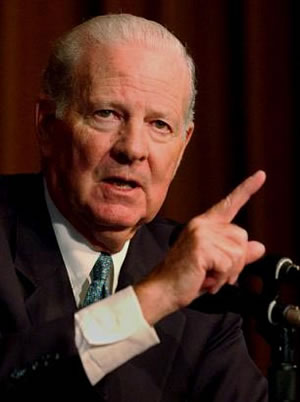
On November 4, former U.S. Secretary of State James A. Baker III joined the Jackson Institute for Global Affairs and the Yale International Relations Association for a special conversation moderated by Ambassador John Negroponte.
Secretary Baker has served an illustrious – and as he notes, unexpected – career in public service. He is the only person to serve as Secretary of State, Secretary of the Treasury, and twice as White House Chief of Staff for Presidents Ronald Reagan and George H.W. Bush. Starting in 1976, he led an unprecedented five presidential campaigns for Presidents Reagan, Bush, and Gerald Ford. After a distinguished public service career, Secretary Baker founded the James A. Baker III Institute for Public Policy at Rice University.
Secretary Baker noted that his grandfather gave him three pieces of advice: work hard, study, and stay out of politics. “I ended up listening to two out of those three pieces of advice,” he jokes.
His unexpected move into politics came while mourning the early death of his wife in 1970. Secretary Baker’s tennis doubles partner in Texas had encouraged Baker to help him run for the Senate. That tennis partner happened to be George H.W. Bush.
“I told George that, one, I don’t know anything about politics, and, two, I’m a Democrat. ‘As to the second point,’ George said, ‘we can fix that,’ and that certainly turned out to be the case.”
Secretary Baker’s talk focused on three great challenges that the United States faces today: ISIL, Russian incursions in Ukraine, and managing China’s rise.
“Though the past thirteen years have taken a toll on the American people…I believe that talk of our decline is exaggerated, and it is easy to underestimate America’s strength. At home, we have a pretty resilient political system, a constitution that has lasted almost 250 years…and we routinely transfer political power without tanks in the streets.”
With regard to ISIL, Secretary Baker affirmed that if left unchecked, this cancer could eventually harm the United States. With no hope of relying on either a moderate Syrian opposition or the Iraqi army, Secretary Baker urged the Obama administration to pull together every country involved and tackle this issue through a multilateral strategy and an international coalition.
In Ukraine, Secretary Baker mitigated the idea that the United States is returning to a Cold War with Russia, though he affirmed that relations have certainly chilled. He praised President Obama’s use of sanctions against Russia, and ultimately encouraged a lasting solution by finding a way to integrate Russia once again into the international fold.
Last, with China, Secretary Baker noted that China’s rise is inevitable and constitutes “perhaps the most spectacular economic rise in history.” He continued, “How America’s policy reacts to that rise will be one of the most important geopolitical issues of our time.” Though China’s growth is impressive, Secretary Baker drew the audience’s attention to cracks in the armor, namely a slowing economy, an imminent housing bubble, and the fact that China wields far less diplomatic influence than the United States. Ultimately, he encouraged U.S. policy to look to issue areas where U.S. and Chinese interests converge, particularly trade and energy security, and dissuaded any notion of an enemy mentality toward China.
“There’s no surer way to find an enemy than to go looking for one.”
While fielding questions from the audience, Secretary Baker tackled topics ranging from his impressions on the surprise implosion of the Soviet Union to the reintegration of East Germany, as well as thoughts on vitriol in D.C. today, immigration, and the Middle East peace process.
In reference to today’s gridlock in Congress, Secretary Baker affirmed that “the impact of personal diplomacy cannot be understated…and members of Congress need to socialize again.” While Congress’ divisiveness is furthered by a press that has lost its objectivity, as well as by the Internet, at the end of the day “Congress and the Executive Branch must find a way to work together like they have throughout all prior administrations. It is the role of the President of the United States to lead.”
